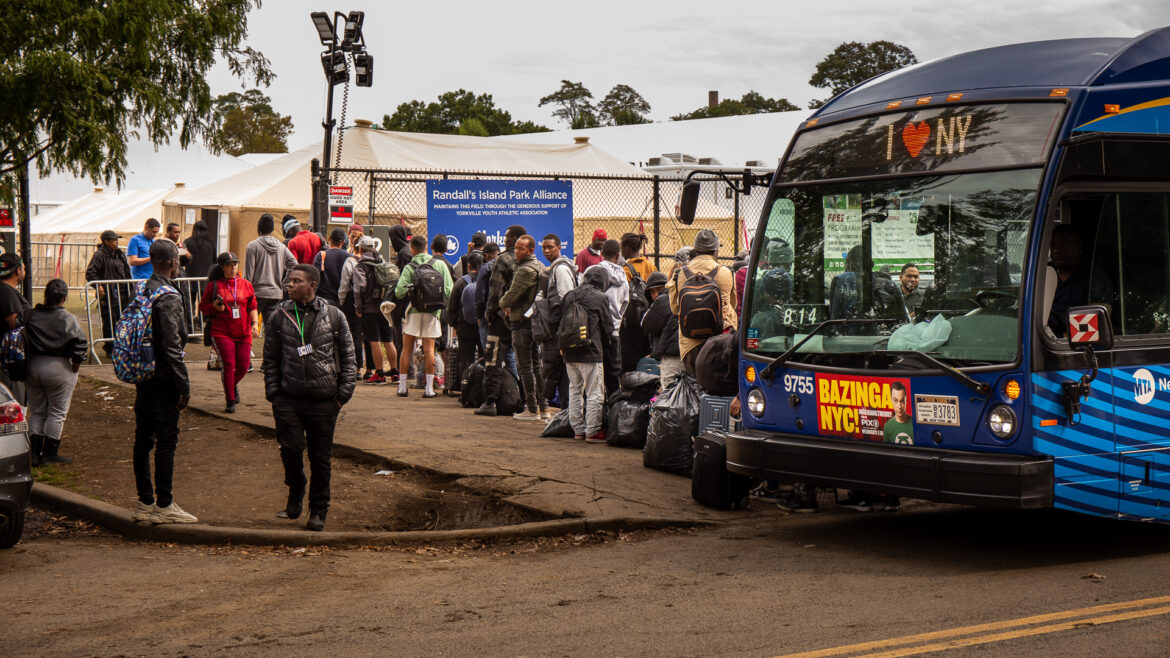
Right to Shelter Settlement Enforces Unequal System, Critics Say
While defenders see the preservation of shelter rights in the long term, opponents are raising implementation concerns. They say the agreement enforces a recent trend of unequal treatment based on when a person arrived, and from where.
Adi Talwar
A shuttle bus bringing newly-arrived immigrants to the city’s tent shelter complex at Randall’s Island on Oct. 18, 2023. Under a new settlement agreement, most single adult migrants will be limited to just an initial 30 or 60-day shelter stay, unless they can prove an “extenuating circumstance.”
A new settlement between Mayor Eric Adams’ administration and a major homeless advocacy organization raises serious implementation concerns and enforces a recent trend of unequal treatment for shelter-seekers depending on when they arrived here, and from where, according to a chorus of critics.
On Friday, Coalition for the Homeless entered a 24-page agreement with the Adams administration, establishing an emergency addendum to the 1981 consent decree in Callahan v. Carey, a state lawsuit that established the right to shelter for single men.
A broader set of rules stemming from Callahan and subsequent court decisions has long obligated New York City to shelter anyone in need, at least temporarily.
But Friday’s settlement, the result of five months of closed-door negotiations, sets new limits on shelter eligibility for certain adults without children. Specifically, those who have arrived in New York City from another country since March 15, 2022—an ongoing period defined in the settlement as the “New Arrival Crisis.”
“The system was never built for people to come [from] anywhere on the globe, stay here for as long as they want, on taxpayers’ dollars,” Mayor Adams told reporters Tuesday. “We want to continue to seriously encourage people, you have to find your way in this city, like so many other immigrants have and are doing, right now as we speak.”
Since last summer, City Hall has limited how long single adult migrants can stay in shelter. But Friday’s agreement goes further, eliminating their blanket right to reapply for a placement after 30 or 60 days. It also requires these new arrivals to cooperate with an initial eligibility screening, including a review of housing options outside the city.
“To legally enshrine an unequal system is obviously deeply concerning to us,” said Marika Dias, managing director of the Safety Net Project at the Urban Justice Center.
Under the agreement, migrant adults without children who wish to remain in shelter following a 30-day stint—or, in the case of young adults, 60 days—will have to apply for an “extenuating circumstance” exception, unless they are disabled. Prior to that, they will receive intensified casework, Deputy Mayor Anne Williams-Isom said Tuesday.
Currently, about 20 percent of single adults are seeking another shelter bed following their initial stay, according to City Hall. The administration is not systematically tracking where people go when they exit.
Friday’s agreement does not impact parents and minor children, who currently make up more than three quarters of the city’s migrant population. Some families have been subject to 60-day shelter limits since January, albeit with an unqualified right to reapply.
Mayor Adams initially sought to modify Callahan in May 2023, arguing that the city was not equipped to care for a large influx of asylum seekers, and renewed the request in October. Over 182,000 have arrived since Spring 2022, according to the city, and 64,500 are currently in city care, pushing the overall shelter population north of 120,000.
“The city and state wanted to obliterate the right to shelter,” David Giffen, executive director of Coalition for the Homeless, told City Limits, defending Friday’s settlement. “This is a temporary overlay that will be lifted as soon as we’re past the crisis.”
The Coalition drew praise from former City Council speaker Christine Quinn, CEO of the family shelter provider WIN. The organization declined to discuss criticisms of the settlement this week, but Quinn stated Friday that the Coalition “halted” attempts to further gut the right to shelter, which is “here to stay.”
Steph Rudolph, a staff attorney with the Legal Aid Society who helped negotiate the settlement on the Coalition’s behalf, added that an adversarial litigation process would have had consequences. A lengthy appeals process would have inevitably ensued.
Meanwhile, migrant adults have endured long wait times—days, even weeks—for a new placement, stuck in line outside the former St. Brigid School in Manhattan. “Even if we won everything, it would have taken a long time and a lot of people would have been on the street throughout really hot days and really cold days,” Rudolph said.
Adi Talwar
About 340 migrants waiting in a line at Saint Brigid School in the East Village to reapply for shelter on Jan, 8, 2024.
By April 8, the city has agreed to stop using so-called “waiting areas,” which lack beds, and have served as a sort of way-station for single adults between placements. However, one or more will remain open as a fall-back option for people who decline a placement or arrive in the middle of the night.
The city already has a precedent for shelter eligibility screenings, Rudolph noted, whether for families with children, runaway and homeless youth, or domestic violence survivors.
Deb Berkman, supervising attorney of the Shelter Advocacy Initiative at New York Legal Assistance Group, agreed. But she did not find the comparison favorable.
Berkman helps clients navigate the longstanding Department of Homeless Services intake process for families. Following a brief, conditional placement, they must provide substantial amounts of information to prove their eligibility for a longer-term stay.
Screeners investigate a family’s housing options before granting shelter—a process similar to that laid out in the Callahan settlement. “We have seen, time and time again, families forced into street homelessness because they can purportedly stay with people who in actuality will not let them stay there,” Berkman said.
Dias, of the Safety Net Project, added that while shelter screening is nothing new, she sees a “categorical difference” in the establishment of a system that sorts people based on their national origin and time of arrival in New York.
“The concern is that there are requirements that are tied to your national origin and that there are restrictions on your ability to stay,” she said.
Ingrid Lewis-Martin, chief advisor to the mayor, explicitly delineated between different shelter populations at Tuesday’s press conference. “It was also important for New Yorkers who support the right to shelter for our own indigenous population to know that we want to help our own indigenous population in the proper way,” she said.
Attorneys are also scrutinizing the Callahan settlement’s language on shelter standards.
According to the agreement, a person’s initial placement may be in a shelter or hotel in the city, elsewhere in New York, or even outside the state. The city “wanted to keep their options open,” said Josh Goldfein of Legal Aid, and at one point considered using hotels in New Jersey, but was deterred by the complexity of that sort of expansion.
The settlement includes minimum standards for hotels outside New York City, including a food allowance, and transportation back to the city when a placement ends. But it drew sharp criticism from Lauren Desrosiers, a senior staff attorney at the Justice Center at Albany Law School.
Desrosiers supports migrants who have been relocated to Albany since last spring, of whom she said there are currently over 900, coordinating with local government officials and offering immigration legal services. She noted that monitors’ hotel access under the settlement is confined to common areas, limiting inspection capabilities.
“They are damning them to basically be shipped wherever New York City wants without a single safeguard,” she told City Limits.
Some advocates also expressed doubt that the shelter extension process will play out smoothly.
Diane Enobabor, founder of the Africa is Everywhere initiative, does mutual aid work and policy research to support African migrants. Black men became the “face” of New York City’s asylum seeking population this winter, she noted, standing in long lines outside St. Brigid.
Enobabor summarized their treatment as “organized abandonment,” and said that structural racism fueled the “crisis” rhetoric in a city that has long prided itself as welcoming to immigrants. Inadequate translation services could exacerbate challenges for these migrants now facing assessments to merit a shelter extension, she added.
Jamie Powlovich, executive director of the Coalition for Homeless Youth, drilled down on some of the extenuating circumstances that could merit a shelter extension. For example, the city will have discretion to keep sheltering people who have made “significant efforts” to resettle outside shelter, such as looking for a job or housing.
“We’re talking about young people that don’t have, for the most part, a lot of formal employment history,” she said. “How do you determine that someone is actively working toward housing?”
Rudolph, of Legal Aid, said that their organization will be watching the city carefully and will intervene if the agreement is not being properly enforced.
“The judge has been very clear that his door is open to us if we need it, and if we see people being denied who didn’t get case management at all or did make the efforts that they needed to make… we would enforce the agreement,” they said.
Under Rudolph’s interpretation of the settlement, single migrants can reapply for a bed even if the city finds they lack an extenuating circumstance, or if a person’s housing falls through. Options for the latter are spelled out in the settlement. “At the end of the day, there’s nothing in the agreement that stops people from reapplying,” Rudolph added.
Ed Reed/Mayoral Photography Office.
Deputy Mayor Anne Williams-Isom addressing reporters at a press briefing Tuesday.
But Williams-Isom told City Limits Tuesday that the city could reject a person who seeks to reapply during the emergency period. “I don’t think there’s probably a technical reason that someone couldn’t try to reapply, but based on the settlement… if there is no extenuating circumstances we will not be giving them an extension,” she said.
Williams-Isom went on to praise Legal Aid, saying the administration is always open to further discussions about “things we can do better.”
On Sunday, 1,901 single adult migrants were on an active waiting list for a new shelter bed. Under the settlement, City Hall must report weekly on the number of single adult migrants who seek an extension, the number granted, and the total denied. The first report is forthcoming.
In the meantime, conflicting messaging on the bounds of the settlement is worrying, said Desrosiers of Albany Law School.
“I’m concerned that this points to a critical missing piece that is going to end up with a bunch of people caught in a fight between Legal Aid and New York City,” she said.
To reach the reporter behind this story, contact Emma@citylimits.org. To reach the editor, contact Jeanmarie@citylimits.org
Want to republish this story? Find City Limits’ reprint policy here.
The post Right to Shelter Settlement Enforces Unequal System, Critics Say appeared first on City Limits.


